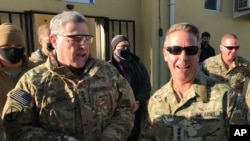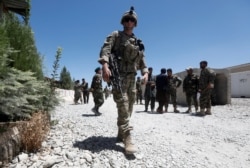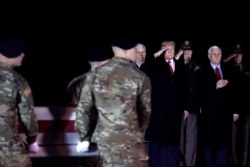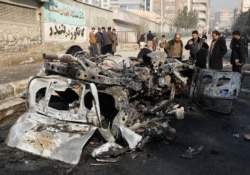Acting U.S. Defense Secretary of State Christopher Miller announced Friday the number of American troops in Afghanistan has been reduced to 2,500, saying the move has brought Washington “closer than ever to ending nearly two decades of war.”
The announcement comes a day after President Donald Trump said U.S. service members in the war-ravaged South Asian nation “are at a 19-year low” and reiterated he “will always be committed to stopping the endless wars.”
The phased troop withdrawal stems from a February 2020 agreement the Trump administration sealed with the Afghan Taliban aimed at encouraging the insurgent group to negotiate peace with Afghan rivals and bring home all U.S. forces from what has been America’s longest war.
"Today, U.S. force levels in Afghanistan have reached 2,500. Directed by President Trump, and as I announced on November 17, this drawdown brings U.S. forces in the country to their lowest levels since 2001,” Miller said in a statement.
There were around 13,000 U.S. troops at the time of the signing of the pact in Doha, Qatar on February 29 of last year. The deal called for all U.S. soldiers and those operating under a NATO-led military mission to leave the country by May 2021.
“Today, the United States is closer than ever to ending nearly two decades of war and welcoming in an Afghan-owned, Afghan-led peace process to achieve a political settlement and a permanent and comprehensive ceasefire,” the Pentagon chief said.
Miller stressed that the force reduction was an indication of the United States’ continued support towards the Afghan peace process and its adherence to commitments made in the U.S.-Taliban agreement.
Taliban welcomes drawdown
Taliban spokesman Zabihullah Mujahid welcomed Friday’s U.S. troop reduction announcement, insisting Washington was required to do so under the deal.
“We appreciate this step. We call for the Doha agreement to be fully implemented and all American troops must leave Afghanistan by May,” Mujahid told VOA.
“For our part, Islamic Emirate (the Taliban ) renews its commitment to strictly adhere to, and implement all tenants of the Doha pact because we believe it will be in the benefit of both Afghanistan and the United States,” Mujahid added.
The Taliban is bound to prevent the Al-Qaida network or any other transnational terrorist group from using Afghan soil to plot attacks against the U.S. and its allies.
The U.S.-initiated peace process encouraged the Taliban to begin direct peace talks last September with representatives of the Afghan government on a political power-sharing understanding that would permanently end the conflict.
The so-called intra-Afghan negotiations are underway in Doha, although no significant breakthrough has been achieved, nor has the process led to a much-needed reduction in violence in Afghanistan.
Miller reiterated that Washington will continue to execute both its counterterrorism military mission and the train, advise and assist mission support of Afghan security forces working to establish peace in the country.
“Moving forward, while the department continues with planning capable of further reducing U.S. troop levels to zero by May of 2021, any such future drawdowns remain conditions-based. All sides must demonstrate their commitment to advancing the peace process,” he said.
For their Afghan officials played down the significance of the acting U.S. defense secretary’s announcement.
“Our security forces are independently conducting 96% of all operations across Afghanistan. The U.S. troop reduction will not have any negative impact on Afghan forces and the nationwide security situation,” Rahmatullah Andar, a spokesman for Afghanistan’s National Security Council, told VOA.
Violence continues
Meanwhile, deadly clashes between Afghan security forces and the Taliban continue in the country. Local officials said Friday an overnight insurgent raid against security outposts in the northeastern Kunduz province had killed at least ten Afghan troops and injured as many others.
Separately, a suspected Taliban-plotted car bombing on a main highway near the eastern Ghazni city injured seven Afghan soldiers.
The Washington-supported Afghan government, which was not part of the U.S.-Taliban agreement, has lately intensified its criticism of the document for not binding the insurgent group to cease fighting and to cut ties to al-Qaida.
The surge in Afghan violence despite the ongoing peace talks has raised concerns the foreign military withdrawal could lead to more bloodshed in the country, where civilians continue to bear the brunt of the war.
It is unclear how the incoming Biden Administration will approach the peace process. President-elect Biden during his election campaign supported the deal but argued in favor of keeping a small U.S. counterterrorism force in Afghanistan.
The Taliban has warned any deviation from the pact would mean continuation of the war.
“If the U.S. tries to have a counterterrorism presence as well as a peace process it will end up with neither,” tweeted Barnet Rubin, a former U.S. State Department diplomat.
Washington-based Defense Priorities hailed Friday’s reduction to 2,500 troops in Afghanistan as a positive step. The group’s policy director, Benjamin Friedman, said there was no “immaculate withdrawal option,” but the U.S. could still use defense capabilities to achieve counterterrorism aims in Afghanistan.
“The drawdown should continue under the Biden administration, and full exit completed by May, as per the U.S.-Taliban agreement. Calls to keep troops there, perhaps re-labeled as a counterterrorism force, would violate the deal and likely pull U.S. forces back into the civil war,” cautioned Friedman.
He added that the U.S. military presence will also not guarantee a peace deal between the Taliban and the Afghan government. “Sadly, peace is unlikely—no matter what the U.S. does.”
Tens of thousands local combatants, foreign forces and Afghan civilians have been killed since the U.S. and its allies invaded Afghanistan in 2001 to oust the Taliban for harbouring Al-Qaida leaders blamed for plotting deadly terrorist attacks on American cities in September of that year.
The Taliban, however, has since waged a deadly insurgency, taking control or influencing nearly half of Afghan territory, effectively stalemating the conflict.







